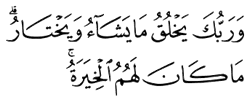God's Choice, Stopping Dictators, Working from the Heart
Issue 921 » November 18, 2016 - Safar 18, 1438
Living The Quran
God's Choice
Al-Qasas (The Story) - Chapter 28: Verse 68 (partial)
 "Your Lord creates and chooses whatever He pleases. Never can they have such choice."
"Your Lord creates and chooses whatever He pleases. Never can they have such choice."
This is a fact people often forget or overlook. Indeed, God creates what He is pleased to create. No one can suggest anything to Him, whether increase or decrease in His creation. No one can introduce any amendment or modification on what He creates. He is the One who chooses whatever and whomever He pleases for the fulfilment of the functions, actions and duties He determines. No one can suggest to Him any candidate, or course of action to follow. None can propose to Him any statement or move. Everything large or small belongs to God alone.
If only this fact was established in people's minds and hearts, they would never feel frustrated. They would neither be elated with anything they receive nor be distressed by anything they miss out on. The choice is not theirs to make; it is God who chooses.
However, this does not mean that they should stop thinking or acting as they wish. It simply means that they should accept what happens after they have done their best to consider, reflect, plan and act. They should accept it willingly. All they have to do is their utmost, leaving the results to God.
Compiled From:
"In the Shade of the Quran" - Sayyid Qutb, Vol. 13, pp. 206, 207
Understanding The Prophet's Life
Stopping Dictators
The voice of conscience may not be loud enough to ensure that people can resist the strong temptation of an easy gain, especially when this has the backing of a legal ruling. Therefore, the Prophet (peace be upon him) emphasized the Islamic principle of "enjoining what is right and forbidding what is wrong." This principle works at both the individual and community levels, and states that wherever there is something wrong, people should speak out against it in order to ensure fairness, justice and virtue. The Prophet sought to mobilize everyone's sense of faith in putting this principle in practice. He said: "Whoever sees some wrong being committed should change it by action. If he cannot, then by word of mouth. If he still cannot, then by denouncing it in his heart. This last one is the weakest type of belief." [Muslim] This principle works in all strata of society and in all areas of behaviour. Whatever is wrong should be denounced and changed. When this cannot be done, and there are many situations where this is the case, then the least a believer can do is to feel a strong dislike towards the situation and to desire for it to be changed.
Injustice may be supported by the power of the state. There are numerous cases in history where dictatorship wreaked injustice on large and small communities. Our present age is full of these, in all continents. Indeed, some historians have called the twentieth century "the age of dictators." The brutality of some of these dictators is beyond imagination. Yet dictatorship can only flourish when the people allow it a chance to establish its roots. When rulers try to circumvent the law in the early days of their leadership, and discover that they can get away with it, they move towards tyranny. If people stand up to such a person in those early days, this can keep the would-be dictator in check. The Prophet made standing up to tyrannical rule one of the best actions a Muslim can do. He said: "The best of martyrs are Hamzah and a person who stands up to a dictator, telling him what to do and what to refrain from, but the dictator kills him." [Hakim] It is well known that Islam makes clear that a martyr is certain to be rewarded by admittance to heaven. Standing up to a dictator gives a Muslim a chance of joining the top elite of martyrs in heaven.
While this is the reward for the individual who is killed by a dictator, the entire community is responsible for stopping a dictatorship. The Prophet warns: "You shall enjoin what is right, forbid what is wrong and prevent tyranny or else God shall punish your whole community." [Abu Dawud, Tirmidhi]
Compiled From:
"Muhammad: His Character and Conduct" - Adil Salahi
Blindspot!
Working from the Heart
Most of us do not consider our work a personal form of worship. Work is worldly. Worship is withdrawing from the world to honour God. But could there be a more beautiful way to honour the Great Creator than by contributing to the re-creation of the world through our gifts? This is what we are called to do each day through our work. Yet it is very difficult to get even a glimmer of the holy when we are harassed, unappreciated, overwhelmed, frazzled, and burned-out.
It's easier to imagine that our work could be our worship if we could perceive the sacred in how we spend at least eight hours of the day. Perhaps the secret to coming to this awareness, no matter what our present circumstances, is to discover the work we would love to do. But until we do, we need to learn to love the work we're presently doing.
Today you can begin to transform your workplace and your working style by considering how much you have to be grateful for. If you have a job, even one you dislike, it's a safety net as you take a leap of faith toward your authenticity; if you're out of work, the path already has been cleared for you to answer your authentic calling. Invoke God as your personal career counselor.
Compiled From:
"Simple Abundance" - Sarah Ban Breathnach